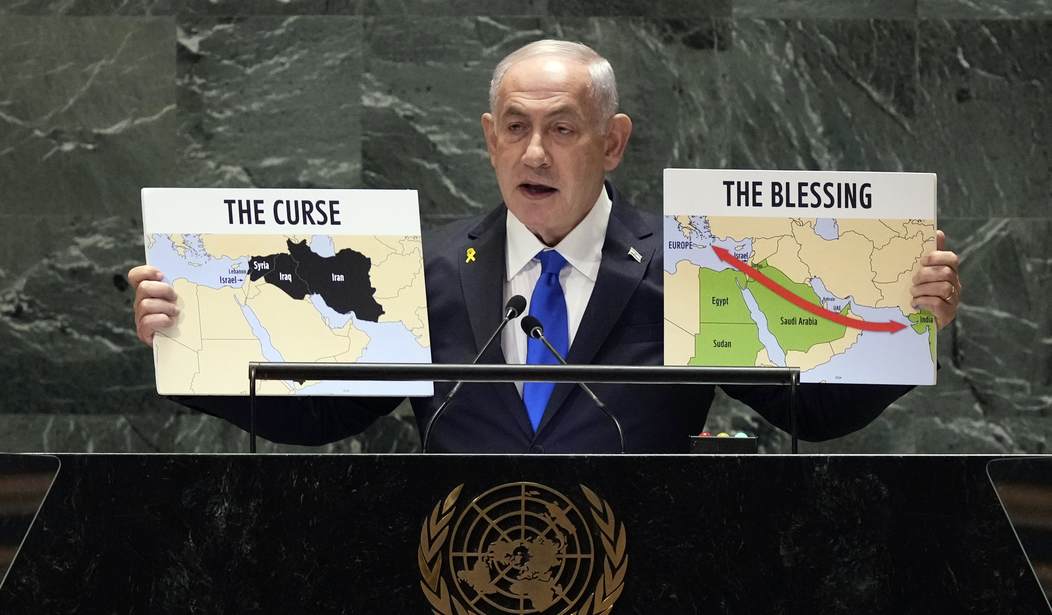So says Al-Hurra, which is interesting of itself, but we'll get to that in a moment. According to Open Source Intelligence Monitor, Arab countries have sent back-channel approval for an Israeli strike on Iran in response to the ballistic-missile attack earlier this month. They understandably want the attack to remain focused and disciplined to prevent a wider war, and they want a heads-up before the attack to prepare a common defense.
In fact, OSINT notes that this appears to be a case of getting the Nasrallah-hit band back together again:
Al-Hurra is reporting that several Arab Counties have recently sent Back-Channel Messages to Israel expressing Support for their Retaliatory Strike against Iran, stressing that their Response should be “Strict and Clear” but requesting that they receive an Advanced Notice, so… pic.twitter.com/oF55sMhHU2
— OSINTdefender (@sentdefender) October 21, 2024
Al-Hurra is reporting that several Arab Counties have recently sent Back-Channel Messages to Israel expressing Support for their Retaliatory Strike against Iran, stressing that their Response should be “Strict and Clear” but requesting that they receive an Advanced Notice, so that they may be able to take Precautions in case of a Counterattack.
This Unnamed Group of Arab Nations, claimed to be linked under U.S. Central Command, are also said to have shown Support for Israel’s Strikes against both Lebanon and Syria, including the Strike which Eliminated the Secretary-General of Hezbollah, Hassan Nasrallah.
Why would these countries rally around Israel? Presumably these are the same Sunni Arab countries that have signed up or supported the Abraham Accords that recognize Israel diplomatically for the same reason -- they oppose Shi'ite Persian aspirations to empire. Stephen Green picked up on this at PJ Media:
Nature might abhor a vacuum, but empires love them. The busy empire-builders in Tehran have spent the last two decades extending their reach into power vacuums in Iraq and Syria as part of their attempt to recreate at least part of the old Persian Empire that once covered almost the entire Middle East.
Funding the Houthi rebels in Yemen keeps the Saudis conveniently distracted, too, as well as giving Tehran a way to attack the shipping that Western economies rely upon.
Hamas and Hezbollah in Gaza and Lebanon respectively are Iran's imperial outposts even further west — and the Arab nations have reportedly had enough.
That does make sense and would be consistent with the moves that began under Donald Trump's administration to reorient policy to isolate Iran. The ballistic missile attack probably frightened the Arab nations more than it did the Israelis, because it suggests that the mullahs are flirting with their Armageddon scenario to produce the Shi'Ite messiah they believe will deliver the world to their grasp. That will bind them even closer to the US and Israel than before, unless the US continues to orient itself to Iranian appeasement as Joe Biden and Kamala Harris has done the last four years.
It also may indicate that they see an end coming soon to that policy, perhaps regardless of the outcome of the election. And on that note, let's recall what Al-Hurra is. It is a satellite-TV channel that is funded by the US Agency for Global Media. That's the same agency that runs Voice of America, Radio Liberty, and others. It exists to counter anti-American bias in Arabic media and to push the American perspective on the Middle East. Having this come through Al-Hurra certainly provides some interesting context for this leak, especially considering the intended audience.
How necessary is that effort? Consider the contretemps between Baghdad and Riyadh over whether to allow the Saudi-owned MBC media outlet to operate in Iraq. An MBC report called three of Iran's biggest commanders terrorists, and now the Iraqis have shut them down for it:
After the channel aired a report calling former Hamas, and Hezbollah leaders, as well as Iran’s Quds Force, the “faces of terrorism,” the Iraqi officials decided the television channel’s license was to be revoked.
The suspension was announced by the Iraqi Communication and Media Commission on Saturday, just one day after supporters of Iranian-linked armed groups vandalized MBC's Baghdad offices, chanting, “No, no Al-Saud,” while filming themselves damaging equipment and smashing computers.
The MBC report called Yahya Sinwar, Qassem Suleimani, and Hassan Nasrallah terrorists, all three are considered as such by the US.
The Saudis claimed to be unhappy about the report and are investigating it, but one has to wonder just how upset they may be. The Saudis have no love for Iran or its proxies, but they don't want to stir the pot too vigorously either. They have to turn public opinion in Saudi in a very controlled way to prevent a too-strong reaction to their eventual recognition and diplomatic relations with Israel, and jumping on the side of the Jews in the middle of a war against a Muslim nation is not a great short-term plan.
The only real question would be when Israel plans to pull the trigger on this reprisal. If the reports on Al-Hurra are accurate, it's probably sooner than later.








Join the conversation as a VIP Member